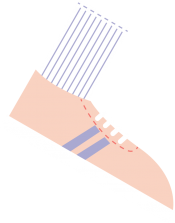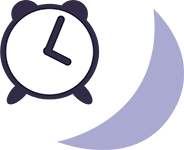SLEEP & ATHLETIC PERFORMANCE
Sleep is a key component of health and well-being. This is especially important for athletes of all ages, where sleep directly impacts an athlete’s ability to recover and regenerate after training and competition.

Three components of sleep are important for competitive success, health and well-being:
1.
Total sleep time = Amount (7+ hours for adults on a regular basis, 8 and 10 hours for teens)
- Night-time sleep
- Naps
2.
Sleep Quality = Poor Sleep
- Primary sleep disorders (Sleep apnea, insomnia, restless legs syndrome)
- Non-restorative sleep
- Travel
3.
Sleep Timing = Circadian Factors
- Delayed sleep phase syndrome (common in teens)
- Jet lag
- Travel
Barriers to sleep in athletes:
- Athletes have been shown to poorly assess sleep quality, duration and need
 Training volume and schedules (for example, late night ice time for hockey)
Training volume and schedules (for example, late night ice time for hockey)- Competitions increase stress, affect mood, contribute to anxiety
- Travel disrupts schedules and circadian rhythms
- Academic pressures
- Electronics use leads to less sleep time
- Sleep disorders
- Estimated 14% of professional football players have
sleep apnea - Restless Legs Syndrome may affect 13% of marathon runners
- Estimated 14% of professional football players have

Sleep is the foundation of recovery:
- Leads to energy balance, appetite and weight control
- Improves ability to be resilient
- Keeps you healthy to train hard
- Prevents overtraining
- Improves focus/concentration
- Improves recovery from injury
- Improves reaction time and accuracy
- Improves learning and flexible thinking
Coaches, parents and athletes should consider referral for sleep evaluation if you take longer than 30 minutes to fall asleep, wake up frequently at night and cannot get back to sleep, or do not feel refreshed within one hour of waking 5 out of 7 days or more.


Take the “4 Week Sleep Challenge” to learn more about your sleep pattern.
The better your sleep habits, the better you’ll feel!
